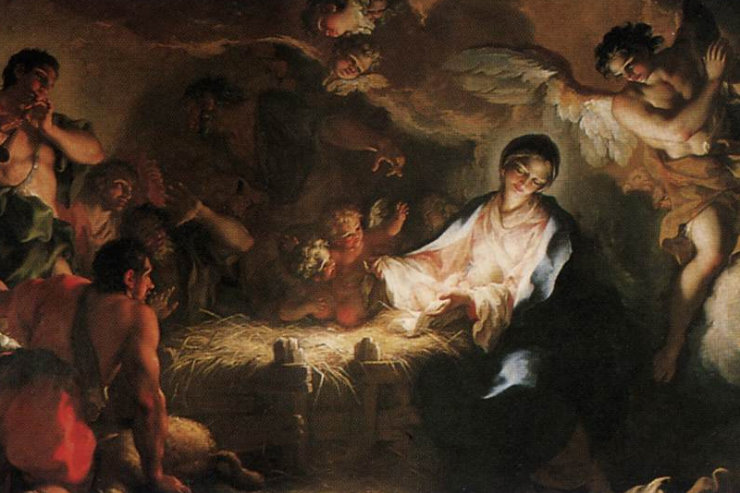Today we celebrate the feast of St. Teresa Benedicta of the Cross, also known as Edith Stein, her name prior to religious life. On this day in 1942, Edith and her sister Rosa were killed at Auschwitz. That summer, hundreds of Catholic Jews were arrested and murdered in response to the Dutch bishops’ public stand against Nazism. I highly recommend Paul Hamans work, Edith Stein and Companions: On the Way to Auschwitz, which recounts the stories of more than 20 of these Catholic Jews – religious sisters, priests, and families.
What stands out when you read about Edith Stein, particularly in those last days of her life, is her understanding of her death in terms of reparation. Edith wrote vividly, years before her death, that she recognized that she was called to carry the Cross in a very real way, and that she was going to share in the sufferings of her people. She was going to be poured out in sacrifice.
In 1939, she wrote to her prioress that she wanted to offer herself “to the Heart of Jesus as a sacrifice of propitiation for true peace.” She said, “I know that I am nothing, but Jesus desires it, and surely He will call many others to do likewise these days.” When she and Rosa were arrested by the Gestapo, as they left the convent, she was heard saying, “Come, Rosa, we are going for our people.”
Like a sheep led to slaughter, like the innocent Christ sacrificed for our sins, Edith and Rosa offered themselves in reparation for the sins of others. As evil swept the continent of Europe, the Stein sisters offered themselves as a sacrifice for healing and conversion. Another similar story is the martyrdom of the Carmelite nuns from Compiègne almost 150 years earlier. The nuns went to the scaffold during the bloodiest days of the French Revolution, offering their lives for the end of the Reign of Terror. The Reign ended ten days later.
While we are not all called to sacrifice our lives in this way, we are called to make reparation for sins – as penance for our own sins, but also for the sins of others. This is a great mystery. Without a supernatural view of existence, it makes no sense. Reparation for my own sins, yes. I can wrap my mind around penance and making amends. But to make reparation for the sins of others? Why should I do penance for someone else?
This came up in several conversations regarding the scandals in the Church. There was backlash when someone suggested we should be doing penance for the sins of the Church. And it’s a natural reaction. Most, if not all of us, have been personally affected in some way by the sins that have come to light lately. Without an eternal view of things, it sounds not only ridiculous but downright offensive to suggest that we should do penance on behalf of men that hurt us.
And yet we believe in the Body of Christ. We understand that there is an interconnectedness of the Body of Christ. Sin hurts us all. Even quiet, private, hidden sin affects the entire Body. Likewise, penance and sacrifice affect the entire Body.
The cloistered sister who has been living behind a grill for forty years – who may have no idea what is happening in the world – is fasting, praying, and doing great penance for us, for the Church, for the world, for people she will never know.
Edith Stein poured out her life as a libation for her people. She saw herself as a sacrifice. Not that she deserved death. Not that she merited the effects of the sins of the world. But just as her Bridegroom, Jesus Christ, embraced a gruesome death He did not merit, so did Edith and Rosa go to the gas chamber as a libation. They offered themselves up in union with their innocent fellow Jews and in reparation for the atrocities committed against them.
No amount of penance on behalf of someone else can erase serious sin on someone else’s soul. But these acts of reparation and penance can obtain actual graces for those people, that they may turn in conversion back to God. The angel told the children at Fatima, “Make of everything you can a sacrifice, and offer it to God as an act of reparation for the sins by which He is offended, and in supplication for the conversion of sinners. You will thus draw down peace upon your country.”
It can be tempting – especially for those who have been personally affected and deeply hurt by the sins of members of the Church – to find the idea of making reparation revolting. But it is what will heal the Church.
There are many who are suffering in our Church today – the victims of abuse and their loved ones, those who feel abandoned by the Church, the falsely accused or those with no recourse. There are many who are being poured out as libations. In various ways, we can all offer ourselves in reparation and in union with those suffering. It is what will draw down peace upon this country and our Church.
Please share this post on Facebook and other social media below:















